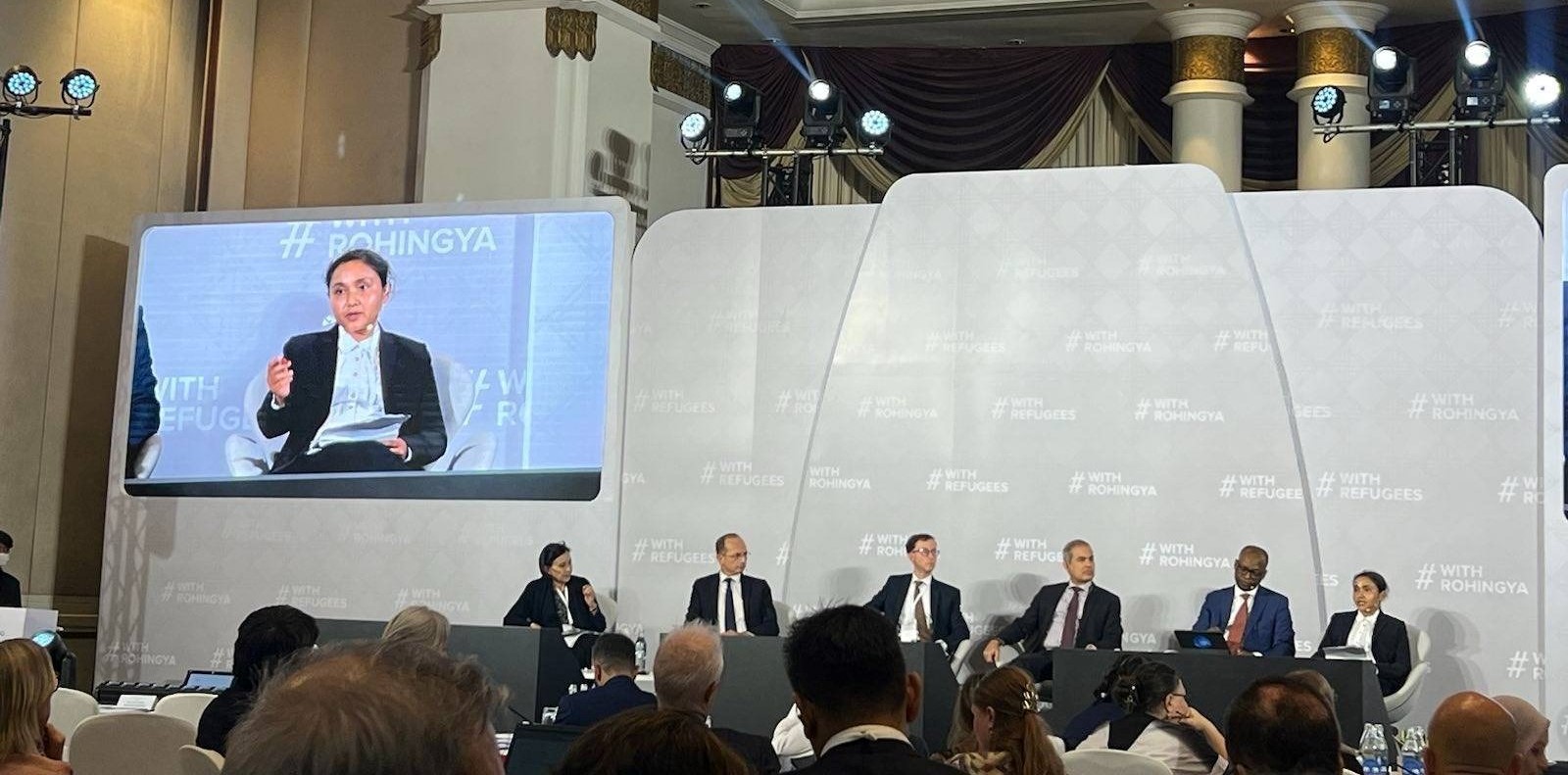
Statements Delivered in the High-Level Meeting
Preface
In the face of one of the most pressing humanitarian crises of our time - the plight of Rohingya refugees - the Asia Pacific Refugee Rights Network (APRRN) recognises the crucial role played by Rohingya refugee-led organisations (RRLOs). This preface introduces a series of impactful statements addressing the imperative need for acknowledging and empowering RRLOs in building resilience and seeking sustainable solutions that were delivered at the High-Level Meeting on Rohingya Refugees held on 17th October 2023 in Bangkok, Thailand.
The statements emphasise the significant contributions of RRLOs in delivering immediate assistance during emergencies, filling critical gaps where international non-governmental organisations (INGOs) and non-governmental organisations (NGOs) may face barriers. Moreover, the statements shed light on the central role of RRLOs in shaping responses to the Rohingya refugee crisis, underlining their unique position to provide comprehensive, practical, and needs-based support.
Resilience building within the Rohingya community is highlighted as fundamental to addressing their needs. The statements stress the importance of community-originated efforts, collaboration with various stakeholders, and the removal of barriers - structural, financial, cultural, and socio-political. The need for innovative approaches granting Rohingyas access to essential services, justice, and meaningful societal participation is underscored.
Recognising the protracted nature of repatriation efforts, the statements call for acknowledging the progress made while simultaneously exploring resilience-focused programs in host countries. These programs aim to provide sustainable solutions, address safety concerns, and offer avenues for education, skills development, and climate-resilient activities.
Furthermore, the statements stress the vitality of enhancing the resilience and capacity of the Rohingya community not only for successful integration but also for empowering them to contribute constructively to host communities. The call to action lies in increased funding and support from the international community to RRLOs and the Rohingya community.
The preface sets the stage for powerful personal narratives - Noor Azizah, a former Rohingya refugee and Co-Founder and Director of Maiyafuinor Collaborative Network, Hafsar Tameesuddin, Co-Secretary General of APRRN; alongside insights from the Lilianne Fan, Co-Founder & Director, Geutanyoe Foundation and engaging closely with the All Party Parliamentary Group Malaysia on Refugee Policy. These voices collectively highlight the urgency of a comprehensive, collaborative, and innovative approach to addressing the Rohingya crisis.
As we navigate the complexities of this humanitarian challenge, the statements reinforce the importance of shared responsibility, resources, and vision to transform this crisis into an opportunity for protection, policy reform, and inclusive, sustainable development. It serves as a call to action, urging a commitment to collaboration and an acknowledgment of the incredible potential within the Rohingya community.
Hafsar Tameesuddin, Co-Secretary General, Asia Pacific Refugee Rights Network (APRRN)
Statement on the Crucial Role of Rohingya Refugee-Led Organisations in Building Resilience and Seeking Sustainable Solutions
The plight of the Rohingya refugees is one of the most pressing humanitarian crises of our time, and it demands an urgent and coordinated response. At the heart of this response, we must recognise the pivotal role played by refugee-led organisations, particularly Rohingya refugee-led organisations (RRLOs). These entities have proven time and again their capacity to deliver immediate and timely assistance during emergencies, filling critical gaps where international non-governmental organisations (INGOs) and non-governmental organisations (NGOs) may encounter various barriers. It is imperative that we understand the central role of RRLOs in shaping responses to the Rohingya refugee crisis, as they are uniquely positioned to provide comprehensive, practical, and needs-based support.
Resilience building within the Rohingya community is a fundamental aspect of addressing their needs. For such efforts to be effective, they must originate from within the community itself and be executed in collaboration with various stakeholders, whether they are local, national, or international. However, achieving this goal requires the removal of various barriers, including those of a structural, financial, cultural, and socio-political nature. We must actively explore innovative approaches that grant Rohingyas access to essential services and justice while enabling their more meaningful participation in society, thereby enhancing their resilience and capacity.
While repatriation remains the long-term solution for the Rohingya people, the complex and challenging nature of this process means it will take time to materialise. Realistically, Rohingyas will continue to reside in refugee camps and host countries until dignified and safe repatriation can be implemented in consultation with the Rohingya communities. It is crucial to acknowledge the progress made in the Rohingya response while simultaneously recognising the necessity to collectively explore resilience-focused programs in host countries. Such programs can enhance opportunities for sustainable solutions and address safety concerns faced by both refugees and host communities. Moreover, they can provide avenues for innovative approaches to education, portable skills development, and climate-resilient activities.
Enhancing the resilience and capacity of the Rohingya community is not only vital for preparing them for successful integration in the event of repatriation or resettlement but also for empowering them to constructively contribute to host communities. Failing to undertake these efforts will render the community vulnerable and dependent on aid.
The way forward in achieving these objectives lies in providing increased funding and support to the Rohingya community and RRLOs from the international community. It is time to acknowledge and harness the incredible agency of the Rohingya people, who, despite facing immense challenges, have demonstrated their ability to create opportunities and livelihoods for themselves and engage positively with host communities. Our response must evolve from a passive stance to an active one, where we work alongside the Rohingya, breaking down barriers and empowering them to be our partners in finding solutions and addressing the Rohingya crisis.
In conclusion, we must appreciate the invaluable contributions of RRLOs and the resilience of the Rohingya community. The humanitarian response must be adaptive, comprehensive, and driven by collaboration between refugees, host communities, INGOs, NGOs, and other stakeholders. By removing the barriers that hinder progress and recognising the potential within the Rohingya community, we can work together toward a more sustainable and dignified future for the Rohingya people. This requires a collective commitment to supporting RRLOs and providing the resources needed to empower the Rohingya in building their own resilience and working towards solutions in their best interests.
Noor Azizah, Co-Founder and Director, Maiyafuinor Collaborative Network
High Commissioner, Honourable Ministers, Ambassadors, Government Representatives, civil society representatives, and fellow refugees; I thank you for the opportunity to address you today. It is now six years since nearly 1 million Rohingya fled from Myanmar into Bangladesh, but in 2017, we already knew that the crisis was going to be protracted. We knew because the situation was already protracted. The Rohingya have been persecuted for decades. No one should believe that it will be solved quickly or easily, and we should not speak about one solution to the exclusion of all others. Every solution must be on the table, every pathway should be explored. We need and expect real commitments from everyone in this room, and many who are not in this room.
I am Noor Azizah, a former Rohingya refugee from Rakhine State in Myanmar. In my early years, I confronted homelessness, statelessness, and displacement. It was in 2003 that Australia extended home to me. I was 8 years and a half. Prior to resettlement, I had no education. Today I graduate with a Bachelor of Education and a Masters in Peace and Conflict Studies from the University of Sydney. I'm now the Director of the Rohingya Maìyafuìnor Collaborative Network and co-founder Hafsa is also present with us today. We are an organisation led by Rohingya refugee women working towards human rights and education for Rohingya, addressing gender-based violence (SGBV), and promoting trans-local solidarity, with an emphasis on empowering women for a more secure and equitable future.
Regular movement is not available to most Rohingya who lack a passport, to begin with, yet onward maritime and overland movement continues as people seek opportunity and refuge for their families. This is neither blameworthy nor surprising, yet refugees continue to be pushed back and lost at sea, or arrested and detained. I recently visited Pidie Camp in Aceh housing 152 Rohingya. Yesterday, another boat arrived with 36 Rohingya yesterday, bringing the total to 188. Infrastructure development and law and policy reform are crucial throughout the region to protect and not punish all of those seeking refuge. We must acknowledge the enduring refugee crisis in ASEAN and ensure protection until Rohingya are safe from genocide and are recognised as citizens in Myanmar and are able to return voluntarily, and in safety and dignity to their home country.
Refugees themselves must be a part of the discussion, the coordination, and the decision-making. Today there are two Rohingya representatives in this room, Hafsa and myself. Meaningful participation is not only the right thing to do as a matter of principle, but it will also make our work more effective. Refugees should be engaged as experts. Engaging with various diaspora communities is also vital. Our perspectives and narratives can provide valuable insights, enriching our understanding and strengthening our collective efforts.
Ladies and gentlemen,
As we convene here today to mobilise commitments, it is imperative that we acknowledge the pressing issues at hand – a lack of funding is leading to cuts to food rations, and a lack of solutions is leading to less compassion, reduced attention, and more feelings of frustration. Insecurity in the camps and xenophobia in host countries are leading to hopelessness and division. These challenges underscore the critical need for a comprehensive, innovative approach to addressing the crisis. A collaborative approach that engages all of us. If we help the community locally, wherever they are, this has an impact on those we help, but also on the wider community and in the long term. I want to emphasise the importance of access to education. By providing these opportunities in more places, we break down the cycle of poverty and exclusion.
In closing, I express my gratitude once again for this platform. I ask for us to commit to collaboration with each other through a ‘whole-of-society approach’. Our collective commitment to addressing the Rohingya crisis is not just an obligation but a shared responsibility that demands our utmost dedication and collaborative action.
Thank you.
Lilianne Fan, Co-Founder & Director, Geutanyoe Foundation
Excellencies, Ladies and Gentlemen,
I address you as Director of Geutanyoe Foundation and the Joint Head of the Secretariat of the All Party Parliamentary Group Malaysia on Refugee Policy.
A clear priority for regional cooperation and shared responsibility is to protect, recognise and effectively decriminalise Rohingya and other refugees and asylum seekers across the region. The lack of documentation and legal status lies at the core of their exclusion, marginalisation, and vulnerability in every context. The lack of a refugee protection framework in almost every country in the region compels governmental law enforcement to apply existing immigration laws, leading to arrest and prolonged detention in overcrowded and costly IDCs. This predicament can be addressed through the formulation of a regional refugee protection framework that can guide countries in the development of national refugee protection laws and policies.
A second priority for regional multi-stakeholder cooperation is the right to work: As our region focuses on post-COVID economic recovery, we have the opportunity to let Rohingya and other refugees accelerate that recovery by simply giving them the legal right to work. A 2019 report by the esteemed Malaysian think tank IDEAS found that, if granted the legal right to work, refugees could contribute MYR 3 billion to the Malaysian GDP within 5 years, as well as an additional MYR50 million in tax revenue per year, and create over 4000 additional jobs for Malaysians. The MEF has called repeatedly for permission to hire refugees. We welcome the Govt of Malaysia’s passing of NSC Directive 23 which will allow refugees to work in approved sectors and stand ready to support the government and potential employers with relevant skills training and other programmes for Rohingya refugee communities.
In embracing shared responsibility and designing initiatives, we must embrace a Whole-of-Society approach. Indeed, multi-stakeholder collaborations are already making an impact on refugees in our region.
At the regional level, the Asia Dialogue on Forced Migration (ADFM), a Track 1.5 process that convenes government and non-governmental leaders from 9 affected countries, has been working to strengthen regional collaboration on displacements including the Rohingya since 2015 and using the Bali Process Consultation Mechanism to convene states around search and rescue. We urge governments to use these mechanisms to coordinate SAR and safe disembarkation.
APRRN, with its network of hundreds of CSOs, has supported legal practitioners workshops in Bangladesh to strengthen legal aid provision in the Rohingya refugee camps.
In Malaysia, the All-Party Parliamentary Group Malaysia on Refugee Policy, established in 2019 as a bipartisan platform has brought MPs into dialogue with the government, including the National Security Council, Ministry of Home Affairs, MoFA, UN agencies, NGOs, academics, private sector, refugee representatives and host communities, opening up the space for serious policy dialogue.
At the local level, Geutanyoe Malaysia is working with local authorities, legal experts, and Rohingya and host community leaders to conduct legal awareness workshops and social cohesion dialogues across Malaysia to combat xenophobia and support peaceful co-existence.
In support of the complementary pathways initiative by the Government of the Philippines and UNHCR to admit Rohingya students to the university, private philanthropists from Singapore are committing funds to support future scholars as well as support more Rohingya children through secondary school in Malaysia.
These are just a few good practices that demonstrate that progress is possible when we share responsibility, resources, and vision. Rohingya have not only resilience but skills, dreams, determination, and incredible potential; they must be part of the creation of solutions. We must not fail the Rohingya any longer. Together, let’s transform this crisis into an opportunity to advance protection, policy reform, and inclusive and sustainable development for all.
Recommended

May 22, 2025
APRRN Urgent Appeal to the Government of Pakistan to Immediately Halt Forced Deportations of Afghan Refugees
The Asia Pacific Refugee Rights Network (APRRN) express our grave concern over the ongoing forced deportations of Afghan refugees by the Government of Pakistan under the so-called “Illegal Foreigners Repatriation Plan.” In April 2025 alone, some 144,000 Afghans returned from Pakistan, including nearly 30,000 who were deported.

Oct. 5, 2024
Urgent Statement on the Rohingya Crisis and the Need for Regional Protection
We express our deep concern over the ongoing Rohingya crisis and the lack of a comprehensive and coordinated regional response to protect refugees in Southeast Asia. As the situation continues to deteriorate, we call for immediate action from ASEAN, its member states, and the international community.

Sept. 4, 2024
APRRN calls on Home Minister Saifuddin Nasution to free children in Malaysia!
“While children are killed and maimed in Myanmar, Palestine, and other countries around the world, Malaysia keeps those who have fled locked up indefinitely for seeking safety in its territory. This is wrong and unacceptable and must be changed in law and practice.” APRRN’s Co-Secretary General, Hafsar Tameesuddin.